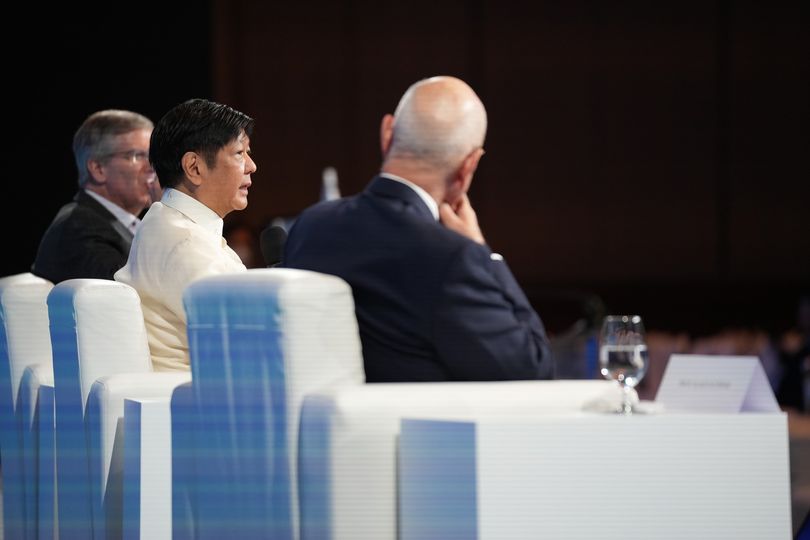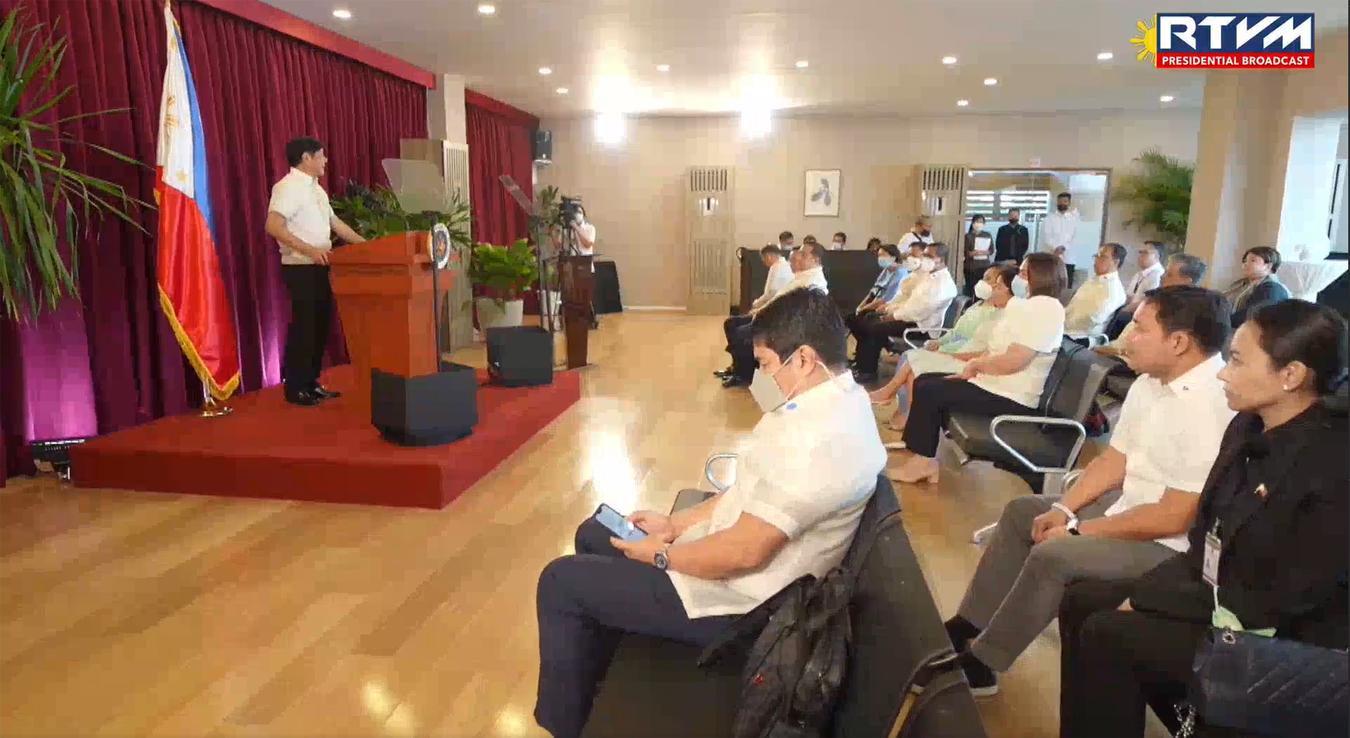Thank you very much and good morning dear friends, colleagues, and distinguished guests. Sawasdee!
It is pleasant to be able to speak with you and hear such a warm Thai greeting face-to-face. It is such a relief for us to be able to go back to the conduct of business in the way that we know is most efficient and most productive.
Our smiles, our greetings are now unmuffled by facemasks, from which we are slowly moving away and our relaxed protocols of late are indeed a sign of better times. We now breathe easier literally as we usher in a period of moving forward with a guarded normalcy and optimism for our daily lives.
Thank you Madam Wei for the kind introduction. I am very pleased to join Dr. Schwab and Mr. Moritz with all of you this morning as I commend once again our host, Thailand and the APEC Business Advisory Council Thailand, for organizing our first face-to-face APEC CEO Summit in three years.
The fact that we are here is in itself already an achievement for APEC and for the Asia-Pacific region, as it is a testament to our pandemic response and its economic resilience.
It is also clear evidence that our region continues to live up to its potential as a dynamo of cross-border trade and investment in the world.
As Member-economies of APEC, we have a great opportunity to continue nurturing this potential and to continue responding to immediate and imminent challenges. After all, the economic miracles of the past four decades were performed by the economies of the Asia-Pacific, and the APEC has been nothing less than a driving force of global economic growth.
That growth was of course interrupted by the pandemic, and our recovery efforts this year have been challenged by soaring prices, supply chain bottlenecks, and serious geopolitical conflict. Dark clouds loom large if we are not to be prepared. They loom on the economic horizon and now more than ever our governments and economies must work closer and better together as partners in order to find that break in the clouds where the light of hope and progress can shine through.
These shocks to our system have had of course a deleterious effect on our efforts at fostering inclusive growth.
To prevent a situation from becoming a prolonged and self-perpetuating problem, we need to immediately address structural and policy issues with the objective of enabling rapid economic recovery and growth in a manner that creates jobs, includes more people into the mainstream, and reduces poverty and inequality.
Three issues I believe are critical to this effort. First, food security is a serious global problem. This is felt by every household, by every family, by everyone. The issues that the world faces now – from climate change, to inflation, to war – are viewed by the ordinary Filipino through the lens of food security.
As these issues are very closely interconnected in this delicate system of global — the global food ecosystem. Steep declines in agricultural output and productivity from widespread damage to farms and to crops have been increasing and they are linked to climate change, which has made extreme weather events such as unpredictable typhoons and severe droughts more frequent and more deadly.
The rise in commodity prices, coupled with supply chain disruptions and inflationary pressures, have obviously contributed to the rising prices of food. And the current conflict between two of the world’s largest agricultural producers has led to a scarcity of grains and fertilizers felt painfully across the globe.
Food security must be a top priority for all governments and developing economies especially must have the policy flexibility needed to ensure an increased domestic food production and diversification and to improve the local agricultural supply and value chain.
Second, we must continue to reinforce global health systems, not only against new and emerging variants of COVID, but also against other infectious diseases that may emerge.
The global economy simply cannot afford another crippling series of lockdowns and travel bans that deflate — that deflate consumer confidence, dampen the recovery of tourism, and derail the stability of global markets.
Governments must continue to invest in pandemic preparedness and in ensuring the resilience of the global health system. Adopting the One-Health approach and strengthening health surveillance systems for emerging and re-emerging infectious diseases, from the human-animal-environment interface, can be part of the solution.
During the pandemic, APEC played a vital role in fostering open and effective dialogue and international cooperation through the sharing of data and knowledge. Our good work in this area must never slow down but rather feed into itself strengthening the foundations and architecture of global health systems and improving the governance of pandemic agility, resilience, and of response.
Third is climate change — the most pressing existential challenge of our time. The Philippines is among the countries at great risk from this crisis, as we stand to lose more than up to 6% of our GDP annually by 2100, according to a study by the ADB.
Global agreements that seek multilateral and multinational solutions to the climate crisis, particularly the UN Framework Convention on Climate Change and the Paris Agreement, are there and they are in force. But not enough progress has actually been made, as emissions continue to rise. The Conference of the Parties, the COP 27 is in full swing, but stronger action is required.
As the energy demands of the modern global economy continue to expand rapidly, diversification into renewables and other sources is imperative.
And to this end, the Philippines has prioritized hydrothermal, geothermal, solar power, wind power as well as other low-emission energy sources by setting a target for a 35% renewable energy in the power generation mix by 2030 and 50% by 2040.
At the same time, the Philippine government will work closely with the private sector to improve the resilience of people and businesses by leveraging the tools of sustainability, such as innovative supply chain systems [and] circular economy models for recycling and upcycling, including of course the Bio-Circular Green (BCG) Economy Model of our APEC host Thailand.
The Future of APEC lies in its ability to revitalize its role as the region that drives the global economy. The Putrajaya Vision clearly shows us where we need to be in 2040 and APEC member countries must be ready to achieve that. It is a great vision at variable — we will achieve it at variable speeds in order to effectively confront and overcome crises, economic or otherwise.
APEC’s size and dynamism, coupled with its strength in consensus-building and implementing multi-year programs, makes it well-positioned for this task.
APEC’s future is also a nod to the past.
We must leverage our region’s core strengths and values as the premier forum in the Asia-Pacific, as an incubator of cutting-edge ideas, as a pathfinder for collaborative solutions to new and emerging trade issues, and as a laboratory for forward-looking
and responsive economic and trade policies.
Let us build — continue to build on APEC’s long-running partnership with the private sector, and be increasing in lockstep with the APEC Business Advisory Council, which is the voice of the business community in the Asia-Pacific.
These partnerships with the private sector are a centerpiece of the transformation of the Philippine economy. APEC’s value and relevance are its ability to work with business. There is no other organization or forum that actively seeks [out] the concerns of business the way APEC does at the — and this tight engagement is what makes APEC unique, functional, and important. And therefore it is an engagement that must not only be preserved but it must be strengthened.
Finally, global and regional economic governance platforms such as APEC are geared towards averting conflict. Like other similar post-World War II institutions, APEC should always remain cognizant of the raison d’être of international economic cooperation.
And we in APEC I believe have found that very difficult balance to a very healthy competition and yet very healthy cooperation.
However the geopolitical currents that we must live with, are some things that we still need to be concerned about. Because prosperity and progress is only possible in a world that is at peace, because we as nations of the world can never achieve our fullest potential unless we do it together.
We must have our sights set high for APEC and for all member countries.
But whatever plans we may have for our countries, for our economies, those will come to naught unless they are within the context of peace in the region and in the world.
Thank you for the opportunity to share these thoughts with such an esteemed audience this morning. I thank you very much. And as I say, as we say in the Philippines: Mabuhay po kayo! [applause]
-END-
Watch here: APEC CEO Summit "The Global Economy and the Future of APEC"
Location: Crystal Ballroom of Athenee Hotel in Bangkok, Thailand




